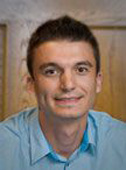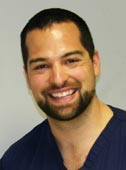RESIDENTS CORNER
A NEW WAY TO LEARN SURGERY: THE COMPETENCY BASED CURRICULUM

Sebastian Tomescu
|
Sebastian Tomescu learned about the CBC
(The Competency Based
Curriculum) curriculum
on the CARMS website
and during his interview.
When the program director
Bill Kraemer asked for
volunteers, half of the residents
applied. Sebastian
liked the module idea. He
thought that it seemed
more orderly than programs
where residents rotate seemingly at random
through psychiatry, then surgery etc. He preferred a
more ordinal approach and likes setting the pace for his
education. He was not looking for a shorter residency,
but for the self- study aspect that he had experienced as
an undergrad at MacMaster.
THE BASIC SKILLS MODULE
The basic skills module in the Mount Sinai skills laboratory
was excellent. CBC residents learned to use power
tools, working with bones and cadaver models. They
learned how to gown, how to position patients on the
table and other fundamentals Senior residents, fellows
and cast technicians taught the basic skills. The senior
residents who were involved in teaching said "I wish I
had had this at the beginning".
HIP FRACTURE MODULE
For this module, Sebastian was registered at five or
six hospitals. He was called to the trauma rooms for
fractures, received instructions like "go to Mount Sinai
hospital tomorrow, there are two hip replacements in the
operating room". He did one month of medical consults
in the middle of the rotation. This was the only off -
service experience besides the ICU. Doing the actual
medical consult was quite different from following a
medical team around as his colleagues in the standard
curriculum probably were doing. "The medical residents
were impressed that the orthopaedic surgeons could do
the consults. That used to be off limits to surgeons, but
we had the time and energy and enthusiasm to do them
well. We learned how our medical colleagues think and
we learned the value of a preoperative medical consultation.
This was a better off - service rotation than the
vascular ward or the emergency room where some of
this content material is ordinarily learned. We went to
two or three hip operations per day, each of us got 20 or
30 hip operations in two or three hospitals. We covered
call that day."
Q: Was the perception that you were "stealing cases
from the other residents as a visitor" a problem?
A: "This was solved by always working with a senior
resident and carrying the pager that day. We also did
regular call. When we went to Mount Sinai or Toronto
East General for a surgical case, but we were not asking
where the operating room is, etc. That had been solved
during orientation in module one. We had spent three
days at each of the hospitals and knew our way around."
"We were tested midway and at the end of the module.
The exams were oral and written. There were also
procedural exams - we were given a hip case, and we
had to know the imaging, how to bring them into the
operating room, how to do the checklist, how to do the
history and physical and how to dictate the note -it was
not just a skin to skin operation. We were also required
to know how to direct helpers and focus on evidence.
We were very busy - we were forced to read and be able
to do and explain hip fracture like in a thesis. This kind
of examination gives you confidence. We have had more
orthopaedic surgery - 10 months in one year - than the
6 months we would have in 2 years of standard curriculum.
We have met more staff and been in more hospitals
than the control group. We had the best teachers: Hans
Kreder- where the strategy cards were really good; Oleg
Safir, Peter Ferguson, and William Kraemer were very
involved."
Q: Will this become the new method of training residents?
A: "Timing is tighter, safety is tighter these days, but I
think it will. We'll pioneer it."
ARTHROPLASTY
"We did '100 Steps to Arthroplasty' in the skills lab on
cadavers. The staff pushed me to be able to do the whole
case. It may help to put arthroplasty with the hip fracture
module."
Q: Isn't there evidence that over time people forget
skills they learned in concentrated periods of study?
A: "We will get recall stimulation when on call and also
do the advanced versions, so we won't forget what we
learned in this intensive training."
Sebastian came to Kitchener, Waterloo from Romania in
'96, when he was in grade 7. His parents are family doctors.
He did premed, then kinesiology at Waterloo. After 2 years
of research, he was accepted at Queen's medical school.
When he had to decide between neuroscience vs. surgery,
"the surgical rotation did it". Sebastian feels students need
more exposure to surgeons early in their education. He
plans to study for an MSc in the Surgeon Scientist Program.
|
Jeremy LaRouche is currently
in the paediatric trauma module
of the Competency Based
Curriculum, because in summer
there are lots of fractures
in children to be treated. There
are 21 modules in the CBC. All
of them are experience - based,
except ICU and the medical
consult rotation.

Jeremy LaRouche
|
Jeremy has a very positive impression of the CBC so far.
He was given the objectives of the program at day 1 and
he has been assessed in each module by oral and written
examination and assessment of his skills at performing a
history - taking, physical examination and performing
surgery. The CBC gives more education at the front end
than the standard Halsted model of residency. In the early
training period there is a focus on how to use the instruments
and other fundamentals. These sessions are open to
his classmates who are not in the CBC - "they come as often
as possible". His Hospital for Sick Children orthopaedic
rotation isn't a simple orthopaedic time-based rotation. His
focus is on trauma; he does occasional clinics and helps in
the operating room, but his main responsibility is to carry
the trauma pager. He works in the Emergency room as a
member of the trauma team.
"Regulars" that is those in the standard curriculum tend to
fear CBC residents as potential "case thieves", but Jeremy
was accused only one time in the entire year. The senior
residents seem to enjoy teaching the CBC residents. It's
easy to resolve this problem on scheduled or elective surgery,
but harder to manage on the unscheduled cases. In
the present module, he is not having much OR experience
as most paediatric fractures are treated non-surgically. He
attends the fracture clinic four days, carries the trauma
pager three days, sees emergency cases and might sneak
into the OR, particularly at night or on the weekend. In
contrast, when he was on the arthroplasty service, he was
in the operating room four days a week.
"This has been a great rotation, the pager is the important
link. It pulls us to our module goal". To meet the
experience-based goals of the program, CBC residents are
often required to go to where the specified procedures (e.g.
arthroplasty or fracture plating) are being performed. They
are registered and familiar with all ten hospitals. He crosscovers
in many of them where needed, "earning points for
help rather than theft". He is not just filling the ranks of the
time-based resident complement. Members of the "control
group" don't do rotations at Sunnybrook, St. Michael's or
Hospital for Sick Children in the first year, so he is not
competing with them. He is treated at these hospitals like a
member of the team after the first several months. He has
been in as many as five hospitals in five days. Sometimes his
pager goes off and he is asked to respond to extension 3631.
The question is at which hospital?
Jeremy has worked with 90% of the senior residents and
feels he will be better recognized next year, when he joins
them on other services. There is necessarily a tension
between case experience and "the help that is needed", i.e.
time -based notion of a resident's role. Working out the
best resolution to this is an important evolving issue. In
answer to questions, Jeremy says "I feel that I am way ahead
my PGY 1 contemporaries in experience and more satisfied
and confident. In some ways, in 11 months of orthopaedic
surgery, I feel like a PGY3 in the standard residency group.
That's because they have 24 months of experience, but only
12 months of Orthopedic Surgery, the other time is on
required non-orthopaedic electives." The two experiences
are not the same, as the CBC resident has a less linear picture
of the evolution of a surgical problem in an orthopaedic
patient. If he were filling out a report card, it would say
"this year has been excellent, resource-intensive and A+ for
education. There is less ambiguity, and more focus, more
independent responsibility, but it is less broad."
Jeremy likes being in an experimental group. He was
in the charter class at the Northern Ontario School of
Medicine where his experiences were analogous to his
current educational modules. He is a fourth year navigation
officer in the navy with a total of 10 years naval
experience. He enjoys decision-making. His undergraduate
degree at the University of Toronto was in Economics
and Finance. This background helped him get into the
CBC program. Some of his colleagues said "no, thanks"
because they disliked the fact that there would be an
exam every 6 weeks. He is now on the selection committee
for the next class of CBC residents. They look for
characteristics of an independent learner.
Q: What are the problems?
A: "More effort is required in the CBC program. On the
other hand, it is nice that you could extend your rotation
- for example to become a spine whiz. I want community
orthopaedic surgery rather than an academic program.
There is a research module, I suspect I will do clinical
research within my own practice, mostly at nights and
weekends."
Jeremy's parents are geologists. They moved with him to
Ontario from Quebec at age 8. In his naval program he
trains in navigation two nights per week from 6.30 to 11
PM. He likes serving his country and would like to serve
in Afghanistan. He does martial arts, rock climbing and
some guitar. He taught karate and emotional intelligence
to school children. This has been very beneficial to the
children in strengthening their responses, understanding
their feelings and managing fear. Jeremy has recently
become engaged. He gives great credit to Bill Kraemer and
Peter Ferguson who "have anticipated all the problems and
worked hard to make this program work for us".
M.M.
|